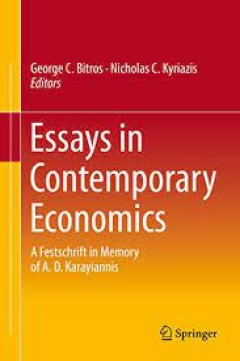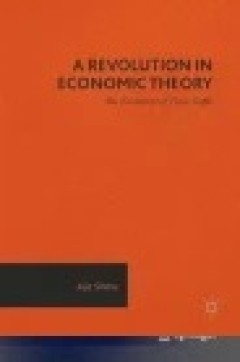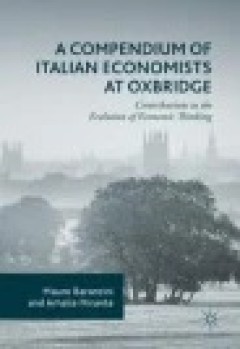Filter by

Ethics, Economics and Social Institutions
The book highlights the ethical aspects and issues that are inherent to economics in the context of today’s prominent social institutions. It reviews a range of problems concerning dominant social institutions, namely markets, government agencies, corporate entities, financial networks, and religious systems. Further, in each case, the book takes a detailed look at the economic problems as th…
- Edition
- -
- ISBN/ISSN
- 978-981-10-0899-3
- Collation
- 4 illustrations in colour
- Series Title
- -
- Call Number
- -

Essays in Contemporary Economics A Festschrift in Memory of A. D. Karayiannis
This book is a collection of original essays grouped into four parts under the headings “Greece and European integration,” “Issues in the Methodology of Economics,” “Institutions and the Free Market Economy,” and “Insights for Today from Ancient Greece.” The essays appeal to both researchers in the corresponding fields of knowledge and also to policy makers who are looking for i…
- Edition
- -
- ISBN/ISSN
- 978-3-319-10043-2
- Collation
- 3 b/w illustrations
- Series Title
- -
- Call Number
- -

Suspicions of Markets
In this work, Rutherford reviews why Adam Smith, Hayek, Mises and others praised economic markets, with a view to understanding, in contrast, historical attacks on markets dating as far back as Aristotle. The market has long been criticized as an inappropriate method of allocation, encouraging market participants to misbehave for the sake of personal gain, and creating an impersonal new market …
- Edition
- -
- ISBN/ISSN
- 978-3-319-40808-8
- Collation
- VI, 194
- Series Title
- -
- Call Number
- -

A Revolution in Economic Theory: The Economics of Piero Sraffa
This book draws on the work of one of the sharpest minds of the 20th century, Piero Sraffa. Ludwig Wittgenstein credited him for 'the most consequential ideas' of the Philosophical Investigations (1953) and put him high on his short list of geniuses. Sraffa's revolutionary contribution to economics was, however, lost to the world because economists did not pay attention to the philosophical und…
- Edition
- -
- ISBN/ISSN
- 978-3-319-30616-2
- Collation
- XVII, 244
- Series Title
- -
- Call Number
- 330 SIN r

A Compendium of Italian Economists at Oxbridge: Contributions to the Evolutio…
This study examines five decades of Italian economists who studied or researched at the Universities of Oxford and Cambridge between the years 1950 and 2000. Providing a detailed list of Italian economists associated with Hicks, Harrod, Bacharach, Flemming, Mirrlees, Sen and other distinguished dons, the authors examine eleven research lines, including the Sraffa and the neo-Ricardian school, t…
- Edition
- Ed. 1
- ISBN/ISSN
- 978-3-319-32219-3
- Collation
- -
- Series Title
- -
- Call Number
- 337.1 BAR c

The University According to Humboldt History, Policy, and Future Possibilities
This book discusses the philosophy and educational reforms initiated by Wilhelm von Humboldt as well as their legacy in the modern university system. It begins with a discussion of the history of the university from antiquity and the Middle Ages through the era of Humboldt’s reforms and its remnants in and implications for the present day. The authors then delve into policy, outlining the key…
- Edition
- -
- ISBN/ISSN
- 978-3-319-13856-5
- Collation
- -
- Series Title
- -
- Call Number
- -

The Theory of New Classical Macroeconomics A Positive Critique
This book examines new classical macroeconomics from a comparative and critical point of view that confronts the original texts and later comments as a first dimension of comparison. The second dimension appears in a historical context, since none of the new classical doctrines can be analyzed ignoring the parallelism and discrepancies with the theory of Keynes, Friedman or Phelps. Radicalism o…
- Edition
- -
- ISBN/ISSN
- 978-3-319-17578-2
- Collation
- -
- Series Title
- -
- Call Number
- -
 Computer Science, Information & General Works
Computer Science, Information & General Works  Philosophy & Psychology
Philosophy & Psychology  Religion
Religion  Social Sciences
Social Sciences  Language
Language  Pure Science
Pure Science  Applied Sciences
Applied Sciences  Art & Recreation
Art & Recreation  Literature
Literature  History & Geography
History & Geography